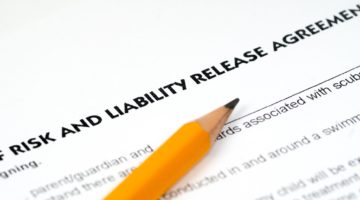As many Massachusetts businesses begin reopening to the public, one of the challenges they face is the threat of lawsuits from customers who claim to have contracted COVID-19 onsite. Should public-facing businesses ask customers to sign liability waivers to protect against COVID-19 lawsuits? The short answer is that requiring such a waiver probably is not necessary in most circumstances, but it can’t hurt from a legal perspective.
Liability waivers have long been the norm for many businesses. If you have joined a gym, sent a child to summer camp, or gone skydiving, you likely have signed one. However, the unique risks presented by COVID-19 may cause other types of businesses, such as salons, retail stores, and restaurants, to consider whether they too should ask patrons to sign a waiver as a shield against lawsuits alleging exposure to the virus. Likewise, business that already use liability waivers may be considering whether to add a COVID-specific clause.
Prospective waivers and releases of liability generally are enforceable under Massachusetts law and preclude a person who signs one from pursuing a negligence claim against the released party. A waiver does not immunize a party from liability for more egregious types of conduct, such as gross negligence, recklessness, or intentionally causing harm to others. Our courts have defined gross negligence as “substantially and appreciably higher in magnitude than ordinary negligence.” In the COVID-19 context, an example of gross negligence might be a hair stylist who continues to work with customers despite having recently tested positive for the virus.
The difficulty in proving where and how a person became infected with the virus likely will limit COVID-19 lawsuits against public-facing businesses. It is one thing to prove that a customer tripped on a banana peel left on the floor of a supermarket, but quite another to establish that a person contracted a communicable disease while getting a haircut. To prevail on a claim alleging exposure to COVID-19, a plaintiff likely would have to prove, at minimum, that he or she experienced symptoms within a certain period of time after patronizing a business, that other patrons (or employees) with whom the plaintiff came into contact also were infected around the same time, and that the business violated safety standards designed to prevent transmission of the virus.
Also, despite the intensity of public concern about the virus, a claimant’s recovery would be limited by the same damages principles that govern other bodily injury claims. A person who does not suffer severe medical complications likely would be limited to a nominal recovery.
Still, despite these factors that may limit the threat of lawsuits, there is no harm from a legal standpoint in asking customers of public-facing businesses to sign a COVID-19 waiver. Liability waivers have long been a simple and effective risk management tool for many types of businesses in Massachusetts, and COVID-related risks are no exception. Though waivers are not a complete liability solution, they are an effective first step in limiting potential exposure. Of course, businesses that traditionally have not asked their customers for waivers, such as restaurants, will need to balance the commercial implications of doing so with the legal benefits.
Waivers of COVID claims should be carefully drafted. They should explain what COVID is and how it is transmitted, and ask customers to acknowledge that they are at risk of contracting the virus onsite, both from an employee or another customer. They should be candid in describing the complications that may result from exposure to the virus, including severe illness and death. Existing waivers, even those that provide for a general release of claims, should be modified to include COVID-specific language in order to maximize their effectiveness.
An alternative to asking customers to sign a liability waiver would be to post a sign onsite advising of the risks of COVID and disclaiming liability, or posting a similar notice on a company’s website. From a liability perspective, these measures are not as effective as a signed waiver, but they are better than taking no action at all. Of course, neither a waiver, sign, nor any other form of disclaimer of liability absolves a business of its obligation to follow federal, state, and local guidelines and safety protocols.
There has been some discussion about federal and state COVID-19 immunity acts to protect businesses from customer lawsuits. Unless and until such legislation is passed, business will need to take steps proactively to limit their legal exposure. A signed liability waiver may not prevent customers from filing COVID-related lawsuits, but a waiver will substantially improve a company’s position in defending those suits.
Share with your network:

